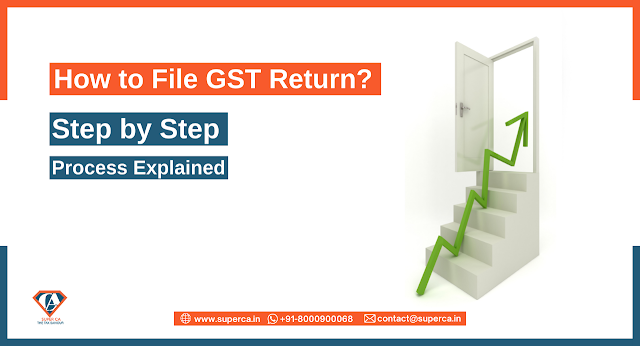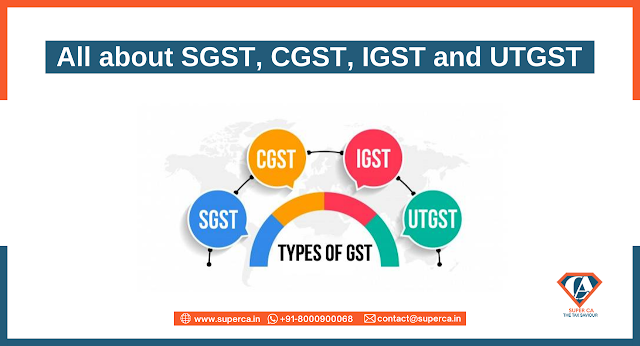What is GST Return?
As per the GST Act, monthly returns and one annual return need to be filed by a regular taxpayer. There are separate returns for a taxpayer registered under the composition scheme, non-resident taxpayers, taxpayers registered as an Input Service Distributor, a person liable to deduct or collect the tax (TDS/TCS), and UID holders. It is important to note that a taxpayer isn't required to file all the types of returns. They are required to file returns depending on the activities they undertake.
GST Return is a form that shall be filed by every registered taxable person. Furnishing GST Returns timely helps the GST authorities carry out taxpayer assessments. Also, business owners need to maintain records systematically to further simplify the online GST return filing process.
A business or the taxpayer while online GST return filing requires details of the following for a specified period of time-
- The total sales
- The total purchases
- The output GST or the GST paid by the customers
It is crucial for every business, irrespective of the business structure, to adhere to statutory compliance and complete all the necessary filings before the due dates. It is important to stay compliant with enormous compliance falling in the year for businesses and entrepreneurs.
Different Types Of GST Returns and Due date?
Due dates are crucially important for every taxpayer not only for sake of online GST return filing and filing prescribed forms under the GST law in a timely, but also to avoid incurring any interest or late fee. Below is the list of all the returns to be filed as prescribed under the GST Law and their due dates.
|
Return
Form |
Description |
Frequency |
Due
Date |
|
GSTR
1 |
Statement
of Outward Supplies made |
Monthly
Quarterly (If opted under the QRMP scheme) |
11th of the next month.
13th of the month succeeding the quarter.
|
|
GSTR
2 (Suspended) |
Statement
of Inward supplies made |
Monthly |
--- |
|
GSTR - 2A |
Read-only documents for the recipient, to
verify the details uploaded by the seller in GSTR-1. |
Monthly |
15th of the next month |
|
GSTR
3 (Suspended) |
Auto populated document based on the
details filled in GSTR-1, GSTR-2 and tax liability of any preceding period. |
|
--- |
|
GSTR - 3B |
Inward and Outward supply summary |
Monthly
Quarterly |
20th of the next month from the month of
January 2021 onwards
22nd or 24th of the month next to the
quarter |
|
GSTR 4 |
Quarterly return for composition traders. |
Annually |
30th of the month succeeding a financial
year. |
|
GSTR
5 |
Monthly return for Non-Resident taxable
people. |
Annually |
20th of next month. |
|
GSTR
6 |
Monthly return for Input Tax Distributor
|
Annually |
13th of next month. |
|
GSTR
7 |
Monthly Return for Tax Deductor. |
Annually |
10th of next month. |
|
GSTR 8 |
Monthly return for E-Commerce Operators. |
Annually |
10th of next month. |
|
GSTR
9 |
Annual
GST return |
Annually |
31st December of next financial year. |
|
GSTR
9A (Suspended) |
Annual Return for Composition Scheme
taxpayer |
Annually until FY 2017-18 and FY 2018-19 |
--- |
|
GSTR 9B |
To be filed by the E-Commerce operator
|
Annually |
31st December following the financial year-end. |
|
GSTR 9C |
Reconciliation Statement |
Annually |
31st December following the financial year-end. |
|
GSTR 10 |
Final GST Return |
Once, when GST registration is cancelled or
surrendered. |
Within 3 months of the date of
cancellation or date of cancellation order, whichever is later. |
|
GSTR
11 |
GST
Return for UID holders |
Monthly |
28th of the next month in which the inward
supplies are received. |
j
|
CMP 08 |
|
|
18th of the month succeeding the quarter. |
Online GST Return filing process
The returns are to be filed online using any of the below methods:
1. Official GSTN portal (www.gst.gov.in )
2. Offline utilities provided by GSTN
3. GST Suvidha Providers (GSPs).
If a taxpayer is already using the services of ERP providers such as Tally, SAP, Oracle etc, there is a high likelihood that these ERP providers would provide inbuilt solutions in the existing ERP systems.
Penalty
The rate of interest prescribed is 18% per annum. It has to be calculated by the taxpayer on the amount of outstanding tax to be paid. The time period will be from the next day of filing to the date of payment.
Late Fees
The original late fees used to be Rs.100 per day under each CGST Act and SGST Act and Rs.200 per day under IGST Act. Also, the original late fee for Nil return filers used to be Rs.25 per day under each CGST Act and SGST Act and Rs.50 per day under IGST Act. However, CBIC has notified reduced late fees to provide relief for businesses having difficulties in GST return filing. There is no late fee on IGST but the maximum limit of late fee is Rs. 5,000.
Form GSTR 9 Annual return, the total Late fees to be paid Rs 200/day (Rs 100 SGST + Rs 100/day CGST). The law has fixed a maximum late fee of an amount calculated at 0.25% of the Turnover for the financial year.
Final Thoughts
In a nutshell, we suggest all the GST
registered people must get their online GST return filing done on a monthly,
quarterly, or annual basis, based on the type of their business within the due
date as ignoring timely filing of GST returns may lead to unnecessary fines.
Hence, being honest citizens of our country and staying compliant, we must
get it filed within the given time period.

Online GST Registration | Online GST Return Filing | Online Company Registration | Online Sole Proprietorship Registration




Comments
Post a Comment